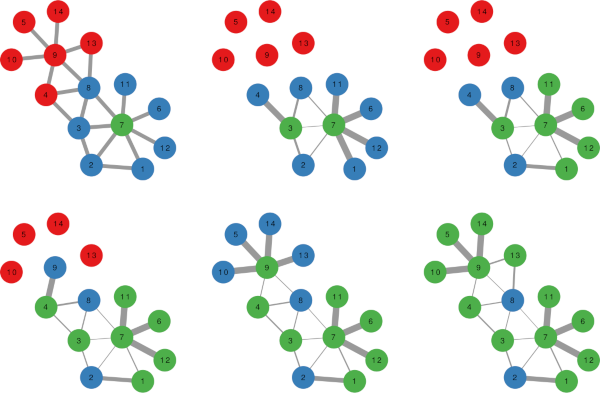Noise Corrected Network Sampling
Implemented by me
Code and data to replicate the results from the paper “Noise Corrected Sampling of Online Social Networks”.
The “data” folder contains the different synthetic networks used for the experiments. Each network comes in two files:
– *.edgelist: one edge per line, two tab-separated columns: node1, node2;
– *.nodelist: one node per line, with header, three tab-separated columns: nodeid, assortative attribute value, disassortative attribute value.
Each network comes in two flavors, weighted and unweighted. All weighted networks have a ‘w’ as first letter in the filename. The four types of networks are:
– er: Erdos-Renyi random graph;
– ba: Barabasi-Albert preferential attachment graph;
– pc: PowerCluster graph;
– lfr: LFR benchmark.
The “code” folder contains the code to launch the experiments. The code is written in Python 3 and requires the following libraries: numpy, scipy, pandas, scikit-learn, networkx, igraph.
– “backboning.py”: a Python library containing the backboning methods, including the one used in the paper (noise_corrected).
– “network_sampling.py”: the Python library implementing the network sampling strategy and the API simulator.
– “01_extract_samples.py”: to be run first, extracts the samples from the networks in the “data” folder. Takes four command line arguments:
– budget: integer, determines the number of seconds you have to explore the network (values used in the paper: 60, 120, 300, 600, 900, 1800);
– api: string, one of sphl, spll, lphl, lpll. See paper for info;
– method: which network sampling method to use (values used in the paper: nc, bfs, dfs, rw, mhrw, ff);
– network: the input network (the two- or three-digit code from the filenames in the “data” folder).
– “02_evaluate_samples.py”: to be run after the first script terminates. Calculates the differences for all analyses between the sample and the original network. Takes two arguments, with the same semantic as the previous ones: “method” and “network”.
The 01_extract_samples.py script takes a long time to run. One suggestion is to run it massively in parallel. To help with the task, I generated a “parameters” file. You can run the following command in the terminal:
cat parameters | xargs -n 4 -P X python3 01_extract_samples.py
You have to replace “X” with the number of threads you can run on your machine. This will launch X threads in parallel. You can use a similar strategy for 02_evaluate_samples.py.

